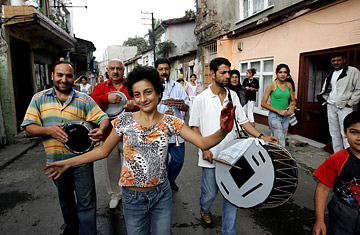
Gypsy musicians play traditional music during a wedding ceremony in the Sulukule neighborhood of Istanbul.
In the shadow of Byzantine battlements, a gaggle of giggling girls runs back and forth among the dilapidated houses, stopping occasionally to expertly shimmy their hips and twirl their wrists. They're chased by several whooping boys, who inevitably catch them and haul them off to "jail," a spot by a wall. The gypsy children of Istanbul's impoverished Sulukule neighborhood — home to the world's oldest Roma community — call this game Cops and Bellydancers, a homespun version of Cops and Robbers amended to reflect their own experience of being born into a life of dancing and dodging the police.
It's early Thursday afternoon, though, and the kids playing on the streets ought to be in school. The reason for their truancy, however, is fear: "The kids are scared," says Dilek Turan, a psychology student who volunteers in Sulukule. "They don't want to go to school because they worry that when they come home, it will no longer be there." It's a valid fear: City authorities plan to demolish their homes as part of a controversial urban renewal project to tidy up Istanbul in time for its stint as 2010 European Cultural Capital.
It was in the Byzantine era that the ancestors of the Roma kids of Sulukule first settled on this particular spot of land, close to the Golden Horn and just outside 5th century city walls of old Constantinople. The earliest record of the community, from about 1050 AD, refers to a group of people, believed to have come from India (where, indeed, most historians believe the Roma originated) who camped in black tents outside the city walls. After the Ottomans conquered Constantinople, the community was granted offical permission by Sultan Mehmet II to make their homes on what is now Sulukule.
For centuries the Roma community eked out a living as fiddlers, fortune tellers and dancers for the Ottoman court, and later for Turks from all walks of life — a tradition captured on-screen in the James Bond movie From Russia With Love. Their fortunes took a downturn in the 1990s, when their "entertainment houses" — private homes in which gypsy families would cook, strum and dance for wealthy Istanbulites — were shut down on allegations of gambling and prostitution.
The Roma of Istanbul are very poor, earning on average around $250 a month, but the land they inhabit, once unimportant and peripheral, is now prized real estate minutes away from the city center. If contractors and the local municipality have their way, the entire neighborhood of Sulukule — home to 3,500 residents — is to be razed by the end of the year to make way for a gated community of 620 up-market neo-Ottoman townhouses.
"Every day, we wonder which house the bulldozers are going to come for," says Nese Ozan, a volunteer with the Sulukule Platform, a coalition of architects, activists and social workers against the demolition. Between every three or four of the squat, derelict houses, one has been reduced to a pile of debris and twisted metal. A red X marks those that are next in line for the demolition teams.
Mustafa Demir, mayor of the conservative Fatih municipality which is running the demolition program, says it's a much-needed social renewal project "to replace hovels." Prime Minister Recep Tayyip Erdogan called Sulukule "ugly", and expressed bewilderment over anti-demolition protests. That the neighborhood is in desperate need of a cleanup is clear, but critics accuse officials of failing to involve one of the city's oldest communities in plans for its redevelopment. Instead, the Roma have been offered two options: They can sell their property at a rate far below market prices (or face having it expropriated), or they can move to public housing in Tasoluk, some 25 miles outside the city, for which they will have to pay a mortgage over a 15-year period that very few can afford.
"The municipality doesn't understand that if it is going to renovate this area, it needs to do it in a way that allows for the community to continue to live here," says Ozan. "They can't just evict everyone, raze the area and build a suburb. This is a historic community."
British Roma researcher Adrian Marsh sees a darker agenda at work. "What we have is the most religious municipality in the country confronting what it deems to be a historically irreligious, immoral group," he says. "If they regenerated the community in a way that was inclusive, they'd have 3,000 extra votes, but they're not doing that. Why? Because they consider the Sulukule community unredeemable." Long-term solutions like allowing the Roma to set up legal music halls and generate income don't appeal to the Islamist-dominated local authority, because it doesn't want to promote that kind of entertainment, Marsh argues.
This much is certain: Disbanding the Roma community of Sulukule will destroy its culture, which is premised on communal life. Extended families share homes and form musical ensembles, using the streets as their rehearsal rooms. "Sulukule presents a unique way of life," concluded an urban design research team from University College, London. "That has to be taken into account and preserved when a new development for the area is being introduced."
The Sulukule Platform is seeking a court injunction against the demolition and parliament has appointed a committee to investigate. But the bulldozers aren't waiting for the outcome. Life's game of Cops and Bellydancers is not going well for the entertainers.
